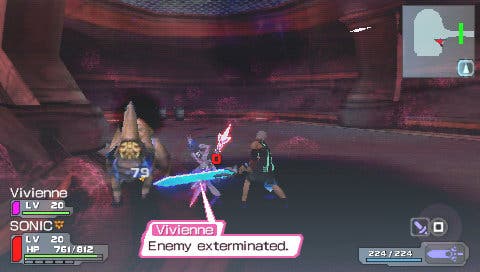Phantasy Star Portable
PSP PSP.
Our hobby is full of forgotten worlds. Cities whose streets and structures were once as familiar to us as New York to a Brooklyn cabbie, in time become as slippery to recollection as last month's dreams. Hills and valleys and forests previously understood as pieces of geography, defining landmarks en route to Rabanastre or the Imperial City, soon become no more than context-less clumps of polygon and texture. It is almost every game-world's fate to be forgotten, sunk as archaeological remains in the overburdened memory of the seasoned, universe-hopping gamer.
For many explorers, however, Phantasy Star Online, the Dreamcast's electric blue blueprint for all console-based multiplayer RPG space quests, is gone but never forgotten. The memories of fighting with friends and strangers for the first time through its purplish corridors and crimson caves remain so vivid we could retrace our virtual steps blindfolded. SEGA may have switched off the servers, but this world will always have its players, those Hunters and Rangers and Force who roam its turf by memory alone. As such it seemed certain that PSO's next-gen follow up, Phantasy Star Universe, would be a surefire hit.
Perhaps it was World of Warcraft's fault. Perhaps it was the sheer petrifying range of choice for the contemporary MMORPG player, or perhaps we mistook the fact PSO was the first and only console-based game of its sort for the illusion that it was the best. Either way, PSU failed to ignite the passions of gamers, its labyrinthine corridors walked by just a hardcore few after the first influx of prospective immigrants left unconvinced of its merits.
But Phantasy Star Universe nevertheless did a great many things well. For those players who could look past the idiotic decision to isolate its single-player and online campaigns (where progress in one had no bearing on the other) and its reliance on subscription-locked disc-shipped content, there were a clutch of neat ideas and elegant tweaks. These built upon and even improved the PSO template in some regards, especially with regard to matchmaking, the job of forming and maintaining a party of likeminded questers.

For that reason Phantasy Star Portable is still a notable release. It is essentially PSU in handheld form, a shrunken port of a forgotten world, but a game, which, in trying to fix that world's problems, has great potential. On paper, the signs are good. The game incorporates all of the PSU tweaks and amends introduced in the recent (and much overlooked) expansion, Ambition of the Illuminus, returning the player's character to the forefront of both the multiplayer and single-player experience.
The previous emphasis on item crafting is gone, refocusing play back onto the random drop system while maintaining all of the weapon and armour customisation that allows higher level players to show off to their peers. The game flow follows PSO's lead, offering a slew of Story and Free missions of varying length and complexity across a wide variety of planets, completion of which nets loot of varying degrees of usefulness. So far, so Sonic Team.
However, Phantasy Star Portable's minor victories threaten to be overshadowed by some ostentatious shortcomings from early on. Principle amongst the game's problems is the lack of online multiplayer: an oversight that, for the Western gamer at least, will seem indefensible for a game seemingly built for communal questing. The problem, as 14 million Japanese Monster Hunter fans will tell you, is a cultural one. While in Phantasy Star Portable's homeland, gamers will often gather at a location - a school hall, a bus stop, a shop corner - to play multiplayer RPGs with one another for hours, Western gamers prefer their handheld multiplayer gaming to be experienced remotely, across an internet connection.
This cultural discrepancy works doubly against Phantasy Star Portable, as the game appears on a relatively niche system in a niche genre. For many Eurogamers, the chances of finding another PSP owner who lives nearby, who enjoys multiplayer RPGs, who owns a copy of Phantasy Star Portable, who is of a similar experience level to your character and who is also free next Tuesday afternoon are so slim as to render the game's strongest selling point irrelevant.

.jpg?width=291&height=164&fit=crop&quality=80&format=jpg&auto=webp)






